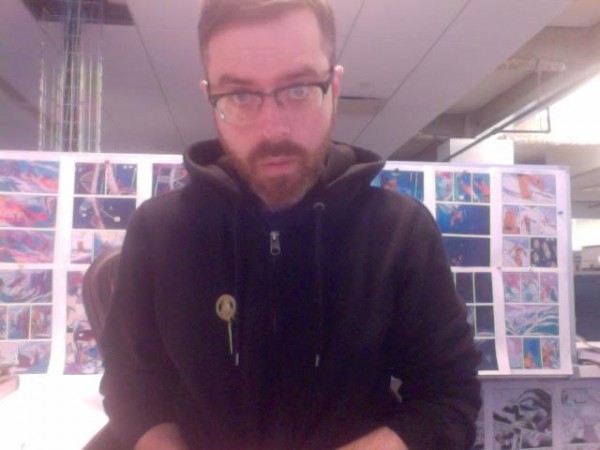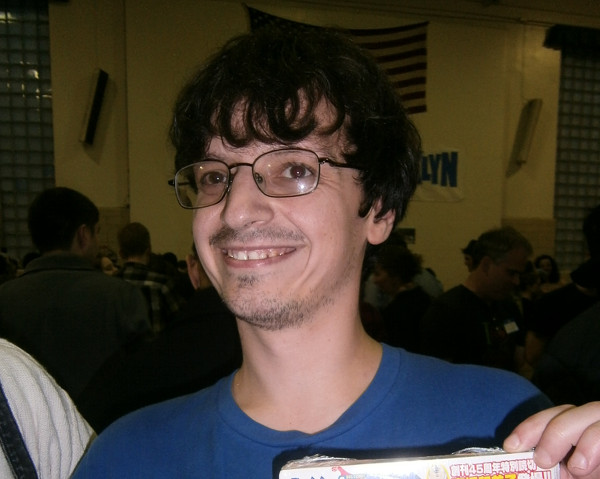
December 18, 2013
 CR Holiday Interview #02—Sean T. Collins and Joe McCulloch
CR Holiday Interview #02—Sean T. Collins and Joe McCulloch



*****
We rarely talk about the alternative and art comics portion of comics as an industry with its own set of concerns. I thought this year might be a good year to do that in the holiday interview series. I chose to have this conversation with
Joe McCulloch and
Sean Collins, both of whom wrote compellingly of the latest important story in that world,
the closing of PictureBox, Inc. I've known both critics -- and Collins is now a writer
of comics -- for years. I respect their observations and insights. I hope that the following has something in here you'll find of interest. I tweaked a bit for flow. -- Tom Spurgeon
*****
TOM SPURGEON: I guess a first question would be how frequently does your conception of alt-/art- comics include an industry component? We seem to maybe blend the business and art in mainstream comics and even in newspaper strips more than we ever conceive of art- and alt- comics that way, and I wonder if you had any thought as to why that is.
JOE McCULLOCH: Well, since you're talking to a pair of critics, my first thought is that there's a big difference between writing about art and writing about industry. Put simply, the former is much easier to do, because in the end it's just you and a book and whatever perspective and experience and theory and wisdom you're gonna bring to the table, and while disagreements are obviously gonna happen -- and I absolutely do think it's possible to write bad criticism -- there's much more in the way of intellectual wiggle room. Writing about industry, though -- you need a very solid grounding in practice, economics, distribution; it's more like math, because you can very easily get a lot of shit obviously, factually wrong, and
nobody likes getting shit wrong, especially when they're not being paid for the pleasure.
 SEAN T. COLLINS:
SEAN T. COLLINS: Good Lord, imagine if
Frank [Santoro] and I had talked about the dearth of alternative-comics reporters instead of
alternative-comics critics. The list would have been, what, two people long tops? "Follow the money" is a solid rule of thumb for this discussion. There's very little money to be made in alternative comics, still less to be made in alternative comics criticism, and, as best as I can tell, zero to be made in alternative comics business journalism. So those habits of thought don't get cultivated, for practical, financial reasons.
McCULLOCH: And, as a result, I think a lot of writers-on-comics today are reluctant to address industry concerns in areas where "industry concerns" aren't already a broad pool of knowledge from which to draw, like with the big superhero publishers. The legwork on them was done years ago, to the point where any random
Bleeding Cool message board poster might find the guts to hold forth on the hard truths of the biz, and not immediately look like a clown. Plus, I think the nature of reading superhero comics -- or reading newspaper comics -- is affected by the fact that they're pretty far removed from the locus of original creation: it's usually hired hands providing maintenance for valuable properties, and while there's obviously an artistic component to that, the observer is nonetheless placed at a certain distance, encouraging speculation as to business practice. That goes triple when superhero movies are involved, because there's just so much fucking money involved -- unreal money! It's like following sports.
With "alternative" comics -- I mean, Jesus! What fucking toad wants to
drop science on "the industry" of what's been whispered into our cradles as the very marrow of the creative urge? Wasn't the whole struggle for comics-as-art about promulgating a theory of 'alternative' or 'art' or 'underground' or [your favorite oppositional term here] comics as separate from readily monetized company craftwork? Let me answer my own question -- it wasn't, not strictly, but this romantic conceptualization probably turned out to be the most immediately appealing of the various arguments for a genus of comics against a status quo, which, 35 years ago, was legally disinclined in the majority of circumstances to even recognize artists as the creators of their own work, per the fictions of authorship that lie at the basis of work-made-for-hire.
COLLINS: This is also true. Though in my experience a lot of makers of, and thinkers about, alternative comics enjoy pulling apart the business practices of any and all industries with which they come in contact, that's only very rarely true of alternative comics as an industry itself. When it comes right down to it I think a lot of people are just kinda bored by the practicalities of funding these things, until a crisis makes it newsworthy.
McCULLOCH: [laughs] Sure -- nobody likes to shit where they eat! But wasn't it
David Foster Wallace who prophesied that the locus of power would reside within "boring" data? Because in the media rush -- we gravitate towards what's the most fun, the tastiest, the most stimulating. So anything that happens in a boring way; you're wearing the One Ring, my friend.
Plus, criticism itself is a field pregnant with theory and ideals, and I think there's a perception that it's anti-intellectual, in some way, to divert one's focus from the object of art itself. I mean, the movement in popular criticism for the last few years has been very much toward a sort of quasi-academic analysis of artistic works as social actors, which reflect or promulgate or repel or inspire resistance to prejudices and inequities in the daily life. In this way, the industrial component, if acknowledged, is often cast in the role of systemic compulsions resulting from some financial interest in maintaining the status quo; declarations tend to go broad. If you mention business too much, I mean -- you feel like one of those movie bloggers who won't shut up about box office. Don't you even like movies, Tom?! Sean and I liked
Only God Forgives.
COLLINS: I even bumped into Nicholas "The Long and" Winding Refn on the street afterwards and told him so. Sensational cinema!
McCULLOCH: But, you know, eventually, if you stick around in comics for long enough: you see people disappear. And not a few people -- enough so that it really hits you in the face with how difficult it is to make a living at this thing. Like, you see one or two or three people vanish, and you think, "Okay, it's like gallery art, it's like screenwriting, it's like music, or anything; few do it forever." But after a while, even if you lack the responsible and/or messianic impulse to want to improve or perfect this scene from which you derive enjoyment and love, you begin to examine your own assumptions about how the field operates, and that pushes you to develop some of the expertise I've mentioned. And, you know, you're growing older, worrying about money, trying to figure yourself out -- it becomes part of the interrogation of your own life. So, yes, I do think about industry, but I imagine really any practicing artist would have developed these opinions long ago; you know this already, but I can assure your readers that every one of these topics are discussed at length, in private, by almost everyone, incessantly.
COLLINS: Ah, there's the other component of it, a phenomenon encapsulated by the cantankerous music and music-industry critic
Chris Ott on twitter the other day with the phrase "Let's take this to e-mail so I can tell you you're right." With the exception of figures who for better or worse, rightly or wrongly, find themselves becoming lightning rods about whom it's okay to opine in public, what you see in print online in terms of discussion regarding the mechanics of publishing alternative comics, or even run-of-the-mill "I don't actually think that book is very good and here's why" criticism, is the tip of an enormous offline, off-the-record iceberg of speculation and shit-talking. For pete's sake
Ryan Cecil Smith saying "I don't much care for
Adrian Tomine's comics" in a series of tweets was forwarded to me by a breathless friend in full "man bites dog" mode. Imagine starting to hold forth publicly about which micropublishers don't pay their contributors, or spilling the open secret that PictureBox was closing down before
Dan [Nadel, Pictur
posted 4:00 pm PST |
Permalink
Daily Blog Archives
November 2019
October 2019
September 2019
August 2019
July 2019
Full Archives


